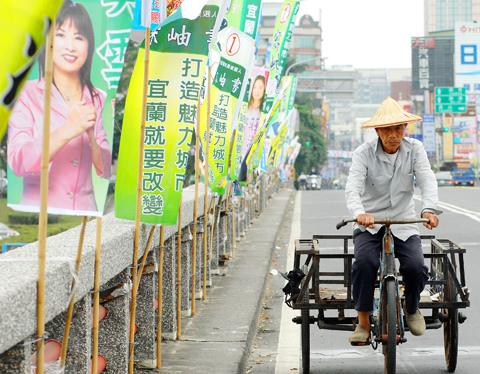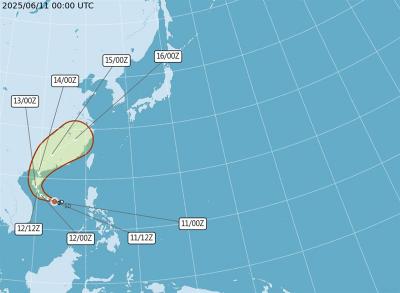Taiwan should be a shining example of democracy in East Asia, but it is tainted by vote-buying, and tomorrow’s local elections are no exception, observers said.
Voters will go to the polls to elect mayors, county chiefs and city councilors across the country amid reports of candidates spending their way into public office despite vows to the opposite.
“We will not buy votes during the elections and we will not become corrupt as the ruling party,” President Ma Ying-jeou (馬英九), also the chairman of the Chinese Nationalist Party (KMT), said late last month.

PHOTO: AFP
Just days after Ma spoke, however, Ministry of Justice data showed prosecutors were investigating 128 alleged vote-buying cases for local mayor and county chief elections and 807 cases in local councilor elections.
“If you look at other East Asian countries like South Korea and Japan, I’d say vote-buying [here] is worse ... by far,” said Christian Schafferer, a political scientist at the Overseas Chinese University.
The situation is particularly serious in rural areas, where local politicians enjoy enormous prestige and often have close personal connections with the voters.
“In the big cities, young people will take the money and vote for whomever they want to, or not vote at all. But older people in the countryside may feel a moral obligation,” Schafferer said.
Part of the explanation is history, traceable back to the end of World War II in 1945, when a defeated Japan gave up 50 years of colonial rule over Taiwan.
When the KMT arrived, it had no links to Taiwanese society and it had to ally itself with existing powerbrokers.
They were typically to be found among influential families who had dominated their communities for generations, offering protection against disaster and public goods in return for grassroots support.
Even today, these families are often still in charge and are more crucial at the local level than the big national parties, said Alexander Tan, an expert on Taiwanese politics at New Zealand’s University of Canterbury.
“Public office is seen as a private thing. They run it like a private corporation. It’s quite entrenched,” he said. “The party is the big dog, and the tail is the local politicians, and the tail wags the dog.”
The price of a vote can range from NT$500 to several thousand depending on how close the race is, said Wang Yeh-lih (王業立), a political science professor at National Taiwan University.
“Candidates usually buy votes through their key campaign staff, who have close ties with the local communities,” Wang said. “The situation has been improving in recent years, with more local staffers being prosecuted for vote-buying.”
Weeding out the practice completely could be hard because the local factions remain crucial for political parties’ ability to extend their power to all corners of society.
“Local families are the ones that have to be courted by the large parties, so in some sense, it’s easier for the parties to look the other way and ignore what’s happening,” Tan said.
“If party A says it wants to clean it up, local politicians will ask, ‘How about party B, do you want to go with us?’” he said.
There is little doubt the harmful impact on democracy is real and often prevents the voice of the people being reflected in election results, observers said.
“In an election for county chief, you have to engage in massive buying, but if it’s an election for the city council, you don’t need so many votes,” Schafferer said. “You can actually take out the other candidate by buying votes. Then of course it’s not good for democracy.”

A magnitude 6.4 earthquake struck off the coast of Hualien County in eastern Taiwan at 7pm yesterday, the Central Weather Administration (CWA) said. The epicenter of the temblor was at sea, about 69.9km south of Hualien County Hall, at a depth of 30.9km, it said. There were no immediate reports of damage resulting from the quake. The earthquake’s intensity, which gauges the actual effect of a temblor, was highest in Taitung County’s Changbin Township (長濱), where it measured 5 on Taiwan’s seven-tier intensity scale. The quake also measured an intensity of 4 in Hualien, Nantou, Chiayi, Yunlin, Changhua and Miaoli counties, as well as

Taiwan is to have nine extended holidays next year, led by a nine-day Lunar New Year break, the Cabinet announced yesterday. The nine-day Lunar New Year holiday next year matches the length of this year’s holiday, which featured six extended holidays. The increase in extended holidays is due to the Act on the Implementation of Commemorative and Festival Holidays (紀念日及節日實施條例), which was passed early last month with support from the opposition Chinese Nationalist Party (KMT) and Taiwan People’s Party. Under the new act, the day before Lunar New Year’s Eve is also a national holiday, and Labor Day would no longer be limited

The first tropical storm of the year in the western North Pacific, Wutip (蝴蝶), has formed over the South China Sea and is expected to move toward Hainan Island off southern China, the Central Weather Administration (CWA) said today. The agency said a tropical depression over waters near the Paracel and Zhongsha islands strengthened into a tropical storm this morning. The storm had maximum sustained winds near its center of 64.8kph, with peak gusts reaching 90kph, it said. Winds at Beaufort scale level 7 — ranging from 50kph to 61.5kph — extended up to 80km from the center, it added. Forecaster Kuan Hsin-ping

COMMITMENTS: The company had a relatively low renewable ratio at 56 percent and did not have any goal to achieve 100 percent renewable energy, the report said Pegatron Corp ranked the lowest among five major final assembly suppliers in progressing toward Apple Inc’s commitment to be 100 percent carbon neutral by 2030, a Greenpeace East Asia report said yesterday. While Apple has set the goal of using 100 percent renewable energy across its entire business, supply chain and product lifecycle by 2030, carbon emissions from electronics manufacturing are rising globally due to increased energy consumption, it said. Given that carbon emissions from its supply chain accounted for more than half of its total emissions last year, Greenpeace East Asia evaluated the green transition performance of Apple’s five largest final